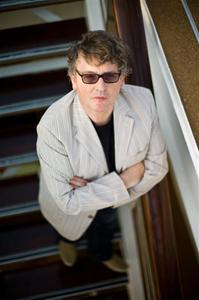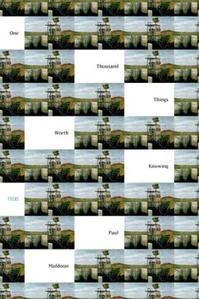 Paul Muldoon was born in Northern Ireland in 1951 and emigrated to the U.S. in 1987. He is the author of 11 previous books of poetry, including the Pulitzer Prize–winning Moy Sand and Gravel. He is the Howard G.B. Clark University Professor at Princeton University and the poetry editor for the New Yorker. His new book is One Thousand Things Worth Knowing (Farrar, Straus & Giroux), reviewed below.
Paul Muldoon was born in Northern Ireland in 1951 and emigrated to the U.S. in 1987. He is the author of 11 previous books of poetry, including the Pulitzer Prize–winning Moy Sand and Gravel. He is the Howard G.B. Clark University Professor at Princeton University and the poetry editor for the New Yorker. His new book is One Thousand Things Worth Knowing (Farrar, Straus & Giroux), reviewed below.
Readers, critics and reviewers have noted that it's often difficult to read and grasp a Paul Muldoon poem. Do you have any suggestions for someone about to read one of your poems?
The best thing to do is come with no expectations. That's how the poems get written. I never know exactly what I'm going to find when I set out to write a poem. I don't know what to wear. I'm not sure if I'm going on a voyage up the Amazon or taking a Husky for a walk. I don't know anything about the terrain. I don't know if I should carry a gun or bring trade goods.
Your new collection's title comes from a reference in the poem "Charles Emil Jacque: Poultry Among Trees." What's the backstory?
The backstory is that this is the title of a 19th-century household encyclopedia with instructions on everything from pickling onions through killing a pig to building a log cabin. It's a title I first came across in a wonderful biography of Quanah Parker, the great Comanche war chief. It was one of the few books his mother, who'd been abducted as a teenager, could remember from her "civilised" Texas childhood. It just felt right for a book in which one theme is how we manage in the so-called "information" age.

Again, I didn't quite know how that would pan out. I was asked to write a poem featuring some aspect of the city of Durham and Cuthbert just showed up. One of the stories about Cuthbert was that half a dozen otters brought him a fresh salmon each day, and they morphed into Seamus Heaney's funeral cortege. I suppose that Ovid is one of my favorite writers, perhaps my single favorite writer, and he seems to have the last word on the phenomenon of one thing becoming another.
There are many occasional poems in the collection. Do you enjoy writing them?
I think all my poems are occasional, in a couple of senses, though not necessarily in the sense that they're written to order. On one hand, I write quite infrequently. On the other, each poem is prompted by the particular circumstances of what sets it off. An image meeting another image at a dinner party and their starting an affair.
You've always loved to play around with words, rhyme and form, to be humorous and witty. Are there poems in this collection that are good examples of what Seamus Heaney affectionally called "muldoodles?"
I think Seamus felt that some of them were a bit frothy rather than ferrous. I happen to like Alexander Pope in both his epigrammatic and epic modes. One's not more or less important than the other. They're just different.
The final poem, a long one, dazzlingly rich in history and allusion, is "Dirty Data," in which we encounter Lew Wallace, Ben Hur, Billy the Kid, Winston Churchill and Bloody Sunday. Why Dirty? Why Data?
"Dirty data" is a technical term for information that has been compromised, either accidentally or on purpose. The Bloody Sunday I refer to is the occasion in Derry in 1972 when British soldiers opened fire on a civilian crowd. As it happens, it's the event that lies behind the long poem in my first book, a poem called "The Year of the Sloes," which uses imagery drawn from Bury My Heart at Wounded Knee, Dee Brown's great book on the Plains Indians. I'm fascinated by the fact that Lew Wallace wrote Ben Hur while he was governor of New Mexico and that the novel explores the relationship between the invading forces and the local population.
What's it like being poetry editor for the New Yorker? Does it allow you to take the poetic pulse of America?
I don't think of myself as taking the poetic pulse but I certainly get a pretty good sense of what's happening around the country. My sense is that U.S. poetry is sound of mind and body. --Tom Lavoie, former publisher

